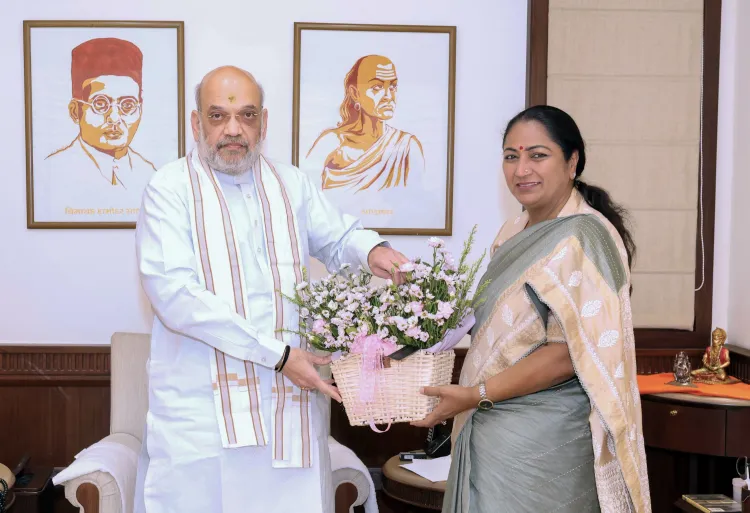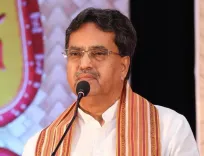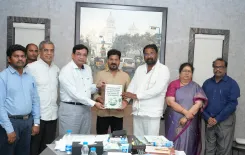What Did Delhi CM Rekha Gupta Discuss with HM Amit Shah?

Synopsis
Key Takeaways
- 33 Urban Ayushman Arogya Mandirs launched to enhance healthcare.
- Each centre provides a variety of medical services.
- Incorporation of wellness programs including Yoga.
- Collaboration between state and central governments for public welfare.
- Commitment to improve healthcare accessibility for all residents.
New Delhi, June 17 (NationPress) On Tuesday, Delhi Chief Minister Rekha Gupta held a meeting with Union Home Minister Amit Shah to deliberate on key development matters. This meeting coincided with the BJP government's launch of 33 Urban Ayushman Arogya Mandirs and 17 Jan Aushadhi Kendras, aimed at enhancing doorstep healthcare infrastructure.
CM Gupta expressed her gratitude to HM Shah and the Central government for their backing of her administration’s development programs and public welfare efforts.
In a post shared on X, the Chief Minister's Office stated, "Today, Chief Minister @guptarekhaji met the Honourable Union Home and Cooperation Minister Shri @AmitShahji."
"During this meeting, we engaged in comprehensive discussions regarding various public welfare topics pertinent to Delhi. The Chief Minister conveyed her sincere appreciation for his insightful guidance, valuable time, and warm conversation," the post added.
Speaking at the inauguration of the Urban Ayushman Arogya Mandirs and Jan Aushadhi Kendras, CM Gupta remarked, "Today, under a unique initiative conceptualized by our Prime Minister Narendra Modi ji, I was privileged to inaugurate an Arogya Mandir (Health and Wellness Centre) here."
"Simultaneously today, we are launching 33 Arogya Mandirs and 17 Jan Aushadhi Kendras across Delhi. I am proud to inform residents that our ministers, MPs, and MLAs are inaugurating these centres at various locations," she continued.
The Ayushman Arogya Mandirs, equipped with advanced health technology, aim to provide a comprehensive range of services and operate as a one-stop centre for all medical needs.
Each centre will feature in-house testing services for 14 diagnostic categories, with access to an additional 79 tests available through outsourcing. Additionally, these centres will now facilitate national-level vaccination programs.
Beyond medical testing and vaccination services, the centres will also offer Yoga sessions every Monday and Friday, family planning support, and pre- and post-natal care. They will operate daily from 9:30 a.m. to 6:00 p.m. and will be staffed by a medical officer, a nurse, a multipurpose worker, and a sanitation worker.
Previously, Mohalla Clinics primarily provided doctor consultations, with most diagnostic tests outsourced and critical services like immunization unavailable. The Ayushman Arogya Mandirs will integrate all these essential services under one roof.
Delhi Minister Kapil Mishra, after inaugurating an Arogya Mandir at a government school in Khajuri Khas, Karawal Nagar constituency, stated, "Our ambition is to establish at least two Arogya Mandirs in every ward within the next three months. We are already making progress, with at least one location identified in each ward."
At Babar Road, the flagship Aarogya Mandir was inaugurated by Delhi PWD Minister Parvesh Verma, who highlighted the initiative’s potential to transform Delhi’s primary health infrastructure.
In Sarojini Nagar, Swati Singh Verma, spouse of Parvesh Verma, inaugurated the local Aarogya Mandir and reiterated the government’s steadfast commitment to public service and accessible healthcare for everyone.
Speaking at the event, Parvesh Verma remarked, "The Prime Minister allocated Rs 2,400 crore to the Kejriwal government to enhance Delhi’s health infrastructure. However, they chose to delay utilizing the funds, fearing that credit for the schemes would go to PM Modi. Today, we are effectively utilizing that very amount to establish real healthcare institutions, not mere political spectacles."
He added, "These Ayushman Aarogya Mandirs will form the backbone of Delhi’s primary healthcare system. Our aim is clear: 4–5 Aarogya Mandirs in every ward and 15–17 in each Assembly constituency. These centres will alleviate the burden on hospitals and deliver quality care directly to every doorstep."







